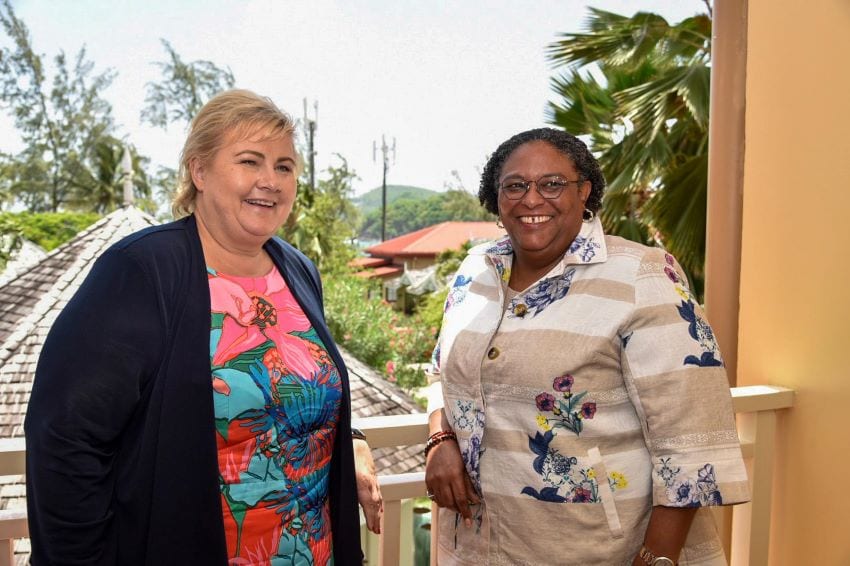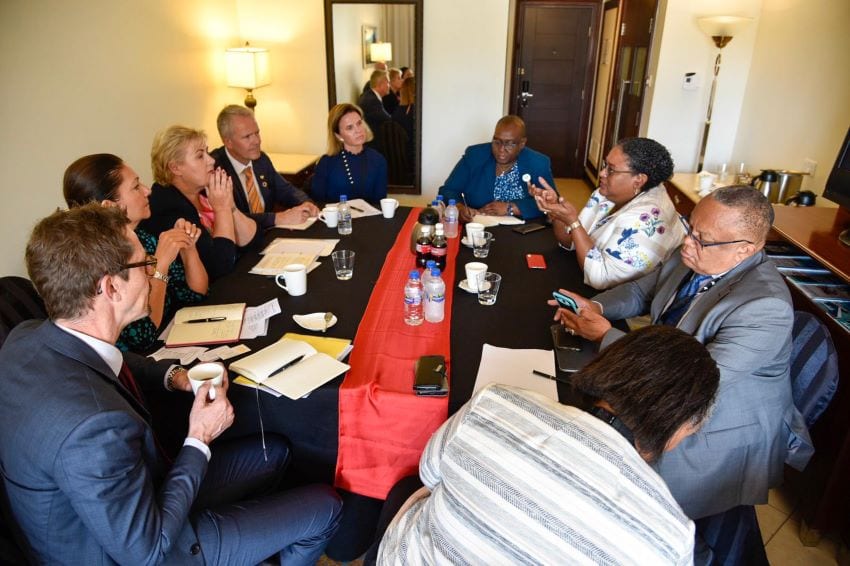
The importance of an urgent, peaceful settlement of the crisis in Venezuela to the stability of Barbados and its Caribbean neighbors was emphasized today by Prime Minister Mia Amor Mottley.
This was stressed as she held bilateral talks with her Norwegian counterpart, Erna Solberg, during the Regular Meeting of the Conference of Heads of Government of CARICOM in St. Lucia.
Ms. Mottley also set out a clear link between marginalization of growth in Caribbean economies by European nations and institutions, and how it helped to feed the radicalization of some groups, especially young men, in regional societies.
The decision of the former Chavez administration to arm militias in Venezuela now means that in the midst of instability and shortages of vital supplies, individuals are trading those guns in Trinidad and Tobago for food. The threat this influx of guns poses, she added, becomes magnified when freedom of movement in the region is added to the mix.
“When the actions of Europe marginalize growth in the region, it puts us all at risk for the radicalization of groups within our communities,” the Prime Minister said.
“It is a major, major issue. There are things we cannot take for granted, and a large part of the instability in Venezuela will only feed into that more.”
In updating Norway’s Prime Minister on Barbados’ economic challenges and what steps Government was taking to correct them, Ms. Mottley spoke of Barbados trying to “catch up from a lost decade”, but being forced to do so with “only half a hand”.
“One of the things that Barbados has prided itself on through the years is that between 1955 and 2007, we ran a fiscal current account deficit only five times – never two straight years, and never more than $20 million.
“But then in one fell swoop between 2012 and last year, every single year we ran a fiscal current account deficit until we became the third-most indebted country in the world.
“When you have your choices taken away from you, it constrains your freedom, and that has been the most difficult part of understanding and going through this process of adjustment,” she said.

Ms. Mottley explained the work done by her party in the year prior to the general elections to prepare for the tasks the new Government would face, as well as the steps taken in the first year to turn around the situation.
“We are passing all of the right road signs,” she added, “but the reality is that it’s a journey and that growth is what’s necessary now to be able to take the country where it has to go, and not just the austerity measures….
“A lot of what we are doing is not just dealing with institutions that have been beleaguered, but also reconstructing all our systems of governance…. A lot of our systems are old, and only appropriate for early to mid-20th century…. We are getting there, while at the same time trying to repair a lot of the relationships that were damaged throughout the years.”
The Prime Minister highlighted tourism and international business as two areas receiving special attention to achieve growth, but noted that renewable energy was a major new area for attention, partly “because of the targets we have set ourselves for 2030”.
She revealed that more than a dozen entities had submitted proposals and were waiting for the conclusion of talks between Government and Barbados Light & Power to end the monopoly on power generation to move to the next step.
“BL&P has had a monopoly on both distribution and generation through the years, and they know they have to give up the monopoly on power generation, but it will probably remain with distribution and that process will most likely finish in a few weeks’ time,” she added.
Roy Morris, Press Secretary, Prime Minister’s Office
